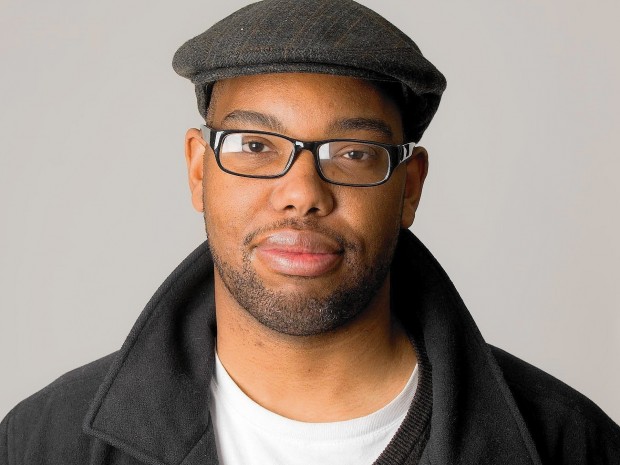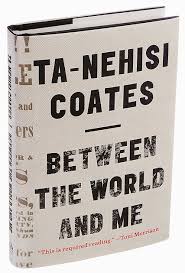
Guest contributor: Bill Lundgren
Lundgren’s Lounge: Between the World and Me, by Ta-Nehisi Coates
categories: Cocktail Hour / Guest Columns / Reading Under the Influence
1 comment

Ta-Nehisi Coates
Many years ago, as I was dipping my toes into the teaching profession, I wrote the following: “Between the campus where I attended graduate school classes and the school where I was student teaching was a large city park. I would sometimes mention my walks through the park to my students (who were all brown or black), describing the welcome sight of the spring’s first crocuses or the sense of wonder that came while watching birds gather material for their nests. One day James, one of my students, interrupted me: ‘Why do you keep talking about that park? Don’t you know that park’s not for us? We’re not welcome there. That’s a park for white people.‘ “ Excerpted from Becoming (Other)Wise, “Notes From a New Teacher.”
 I was reminded of this episode while reading Between the World and Me, the recent, magnificent National Book Award winning work by Ta-Nehisi Coates. Coates’ extended essay is presented both as autobiography and as a letter to his son. The autobiographical thread recounts Coates’ dawning awareness as a young man of the violence that lies at the heart of the European invasion of the Americas and the ensuing formation of the United States. The letter becomes a warning to his son, Samori, of the inherent danger that this violence poses to black males living in the contemporary United States. Coates refers to ‘the Dream’, an idealized version of the country that “the people who believed they were white” cling to in order to nurture the fiction of a society based upon equality and fairness. Coates writes, “I came to see the streets and the schools as arms of the same beast. One enjoyed the official power of the state while the other enjoyed its implicit sanction. But fear and violence were the weaponry of both and ‘good intentions’ “…became a hall pass through history, a sleeping pill that ensures the Dream.” We hear echoes of Martin Luther King Jr. and his thoughts from the Birmingham Jail: “I must confess that over the last few years I have been gravely disappointed with the white moderate. I have almost reached the regrettable conclusion that the Negro’s great stumbling block in the stride toward freedom is not… the Ku Klux Klanner, but the white moderate who is more devoted to order than to justice.”
I was reminded of this episode while reading Between the World and Me, the recent, magnificent National Book Award winning work by Ta-Nehisi Coates. Coates’ extended essay is presented both as autobiography and as a letter to his son. The autobiographical thread recounts Coates’ dawning awareness as a young man of the violence that lies at the heart of the European invasion of the Americas and the ensuing formation of the United States. The letter becomes a warning to his son, Samori, of the inherent danger that this violence poses to black males living in the contemporary United States. Coates refers to ‘the Dream’, an idealized version of the country that “the people who believed they were white” cling to in order to nurture the fiction of a society based upon equality and fairness. Coates writes, “I came to see the streets and the schools as arms of the same beast. One enjoyed the official power of the state while the other enjoyed its implicit sanction. But fear and violence were the weaponry of both and ‘good intentions’ “…became a hall pass through history, a sleeping pill that ensures the Dream.” We hear echoes of Martin Luther King Jr. and his thoughts from the Birmingham Jail: “I must confess that over the last few years I have been gravely disappointed with the white moderate. I have almost reached the regrettable conclusion that the Negro’s great stumbling block in the stride toward freedom is not… the Ku Klux Klanner, but the white moderate who is more devoted to order than to justice.”
And here in xenophobic and very, very white Maine, we have the good ol’ local boys fulminating on Facebook about the inability of drivers to ‘correctly’ merge with traffic, adding “and they’re all Somalians,” and then acting grievously offended when their racism is pointed out to them. It is a phenomena that has been described as “racism without racists,” and Coates is quietly asking us to consider at what point does that ‘devotion to order‘ or standing on the sideline, unconsciously aiding and abetting, become complicit support for a virulently violent and racist culture?
Coates might argue that this question is less relevant then ensuring that his son remain aware of the violence surrounding him and do whatever is necessary to protect and save his body. We are reminded of James Baldwin’s monumental essay, The Fire Next Time, which begins similarly with a letter of warning to Baldwin’s nephew. Coates is a prophet in the tradition of Drs. DuBois and King and Mr. Baldwin, and while many, many well-intentioned people have weighed in on this issue, clearly those we need to listen to are those that actually have skin in the game: their assigned status as people of color gives them a gravitas no person who choose to be white could ever match.
And while race is a cultural construct with absolutely no basis in biology or science, recall if you will what consolation that offered to Trayvon Martin and Freddie Gray and Emmett Till and countless, forgotten others.
Please read this book.

[Bill Lundgren is a writer and blogger, also a friend of Longfellow Books in Portland, Maine (“A Fiercely Independent Community Bookstore”), where you can buy this book and about a million others, from booksellers who care. Bill keeps a bird named Ruby, a blind pug named Pearl, and a couple of fine bird dogs, and teaches at Southern Maine Community College. ]

Thank you for this brief on the book which I just finished. I felt the sadness and sense of futility. Racism seems to be a result of our innate acceptance and understanding of what we know and our instinctive fear of the unknown. it is difficult and seems almost insurmountable and seemingly as they say, “it is what is” – no matter how much we try to make inroads to change things. We just need to keep moving in a direction.